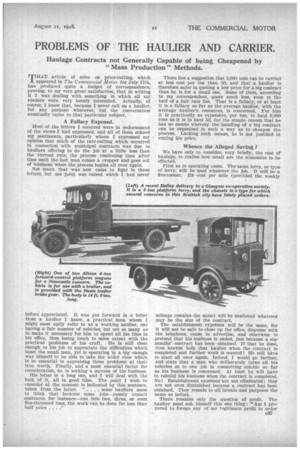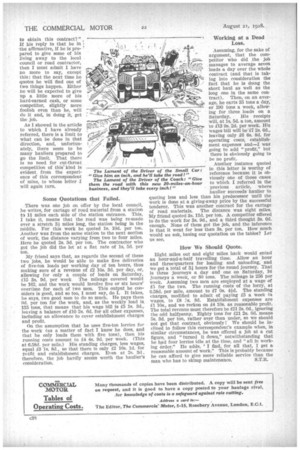PROBLEMS OF THE HAULIER AND CARRIER.
Page 21

Page 22

If you've noticed an error in this article please click here to report it so we can fix it.
Haulage Contracts not Generally Capable of being Cheapened by "Mass Production" Methods.
fT1HAT article of mine on price-cutting, which
appeared in The Commercial Motor for July 17th, has produced quite a budget of correspondence, proving, to my very great satisfaction, that in writing it I was dealing with something in which all my readers were very keenly interested. Actually, of course, I knew that, because I never call on a haulier, for any purpose whatever, but the conversation eventually turns to that particular subject.
A Fallacy Exposed.
Most of the letters I received were in endorsement of the views I had expressed, and all of them echoed my sentiments, particularly where I expressed my opinion that much of the rate-cutting which occurred in connection with municipal contracts was due to hauliers offering to do the job at a little less than the current rate, the process continuing time after time until the last man comes a cropper and goes out of business, when the process begins all over again.
Not much that was new came to light in these letters, but one point was raised which I had never before appreciated. It was put forward in a letter from a haulier I know, a practical man whom I might most aptly refer to as a working haulier, one having a fair number of vehicles, but not so many as to make it necessary for him to spend all his time in his office, thus losing touch to some extent with the practical problems of his craft. He is still close enough to his job to appreciate the difficulties which beset the small man, yet is operating in a big enough way himself to be able to take the wider view which is so essential in appraising those problems at their true worth. Finally, and a most essential factor for consideration, he is making a success of his business.
His letter is a long one, and I will deal with the bulk of it, all in good time. The point I wish to consider at the moment is indicated by this sentence, taken from the letter. " . . . some hauliers seem to think -that because some jobs—county council contracts, for instance—run into two, three, or even five-thousand tons, the work can be done for less than half price . . . ." There lies a suggestion that 5,000 tons can be carried at less cost per ton than 50, and that a haulier is therefore safer in quoting a low price for a big contract than he is for a small one. Some of them, according to my correspondent, quote much less, even to the half of a fair rate list. That is a fallacy, or at least it is a fallacy so far as the average haulier, with the average haulier's resources, is concerned. For him It is practically as expensive, per ton, to haul 5,000 tons as it is to haul 50, for the simple reason that he has no means whereby the handling of a big contract can be organised in such a way as to cheapen the process. Lacking such means, he is not justified in cutting his price.
Whence the Alleged Saving ?
We have only to consider, very briefly, the cost of haulage, to realise how small are the economies to be effected.
First as to operating costs. The same lorry, or type of lorry, will be used whatever the job. It will be a five-tonner. Its cost per mile (provided the weekly mileage remains the same) will be unaltered whatever may be the size of the contract.
The establishment expenses will be the same, for It will not be safe to close up the office, dispense with the telephone, cease to advertise, and otherwise to pretend that his business is ended, just because a sixmonths' contract has been obtained. If that be done, then heaven help that haulier when the contract is completed and further work is wanted! He will have to start all over again. Indeed, I would go farther, and state that a man who deliberately turns all his vehicles on to one job is committing suicide so far as his business is concerned. At least he will have to rebuild his business when the contract is completed. No! Establishment expenses -are not eliminated; they are not even diminished because a contract has been obtained. They remain to all intents and purposes the same as before.
There remains only the question of profit. The haulier must ask himself this one thing: "Am I prepared to forego any of my legitimate profit in order c37 to obtain this contract?" If his reply to that be in .the affirmative, if he is prepared to give some of his living away to the local. council or road contractor, then I must admit I have no more to say, except this: that the next time he quotes he will find one of two things happen. Either he will be expected to give up a little more of his hard-earned cash, or some competitor, slightly more foolish even than he, will
do it and, in doing it, get For the job.
As I showed in the article to which I have already referred, there is a limit to what can be done in that direction, and, unfortunately, there seem to be many hauliers prepared to go the limit. That there competition of this kind is is no need for cut-throat evident from the experience of this correspondent of mine, to whose letter I will again turn.
Some Quotations that Failed.
There was one job on offer by the local council, he writes, for cartage of road material from a station miles each side of the station entrance. This, I take it, means that the road was being re-made over a stretch 3h miles long, the station being in the middle. For this work he quoted 1s. 10d. per ton. Another was from the same station to the next section of work, the distance varying from two to four miles. Here he quoted 2s. 3d. per ton. The contractor who got the job did the lot at a flat rate of is. 5d. per ton.
My friend says that, as regards the second of these two jobs, he would be able to make five deliveries of five-ton loads per working day of ten hours, thus making sure of a revenue of 12 les. 3d. per day, or, allowing for only a couple of loads on Saturday, £15 3s. 9d. per week The mileage covered would be 162, and the work would involve five or six hours' overtime for each of two men. This output he considers is good, and so too, I must say, do I. It takes, he says, two good men to do so much. He pays them 9d. per ton for the work, and, as the weekly load is. 135 tons, that means that his wage bill is £5 is. 3d., leaving a balance of £10 2s. 6d. for all other expenses, including an allowance to cover establishment charges and profit.
On the assumption that he uses five-ton lorries for the work (as a matter of fact I know he does, and that he only loads them with five tons), then his running costs amount to £4 4s. 9d. per week. (This at 6.58d. per mile.) His standing charges, less wages, equal £3 1s. 8d., so that there is only £2 16s. id. for pi ofit and establishment charges. Even at 2s. 3(1, therefore, the job hardly seeihs worth the haulier's consideration.
Assuming, for the sake of argument, that the competitor who did the job manages to average seven loads a day over the whole contract (and that is taking into consideration the • fact that he is doing the short haul as well as the long one in the satne contract). Then, on an average, he carts 35 tons a day, or 190 tons a week, allowing for three loads on a
Saturday. His receipts will, at Is, 5d. a ton, amount to 113 9s. 2d. per week. His wages bill will be-£7 2s. 6d., leaving only £6 6s. 8d. for operating costs, establishment expenses and-I was going to add "profit," but there is obviously going to be no profit.
Another instance quoted in this letter is worthy of reference because it is obviously one of those cases to which I referred in the previous article, where haulier succeeds haulier in quoting less and less than his predecessor until the work is done at a giving-away price by the successful tenderer. This was another contract for the cartage of road materials. The distance was eight miles. My friend quoted 3s. 11d, per ton. A competitor offered to do the work for 3s. 9d., and a third thought 3s. Od. enough. None of them got the job, and the inference is that it went for less than 3s. per ton. How much would we ask, basing our quotation on the tables? Let us see.
How We Should Quote.
Eight miles out and eight miles back would entail an hour-and-a-half travelling time. Allow an hour and threelquarters for loading and unloading, and we get a total of 31 hours for the round journey. That is three journeys a day and one on Saturday, 16 journeys a week, or 80 tons. The mileage is 256 per week. Assuming two men are employed at a wage of £5 for the two. The running costs of the lorry, at 6.58d. per mile, amount to £7 Os. 41d. The standing criarges, modified to admit of paying £5 a week in wages, to 18 Is. 8d. Establishment expenses are £1 10s., and we reckon on £4 10s. as reasonable profit. The total revenue must therefore be £21 2s. Od., ignoring the odd halfpenny. Eighty tons for £21 2s. Od. means 5s. 3d. per ton, rather over than under, so we should not get that contract, obviously We should be inclined to follow this correspondent's example when, in similar circumstances, he was offered a job at a cut figure, and "turned it down," notwithstanding that he had four lorries idle at the time, and "all In working order." He adds, I find, for all that, I get a reasonable amount of work." This is probably because he can afford to give more reliable service than the man who has to skimp maintenance. S.T.R.


































